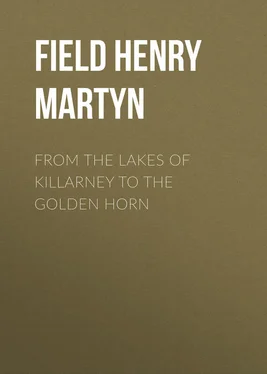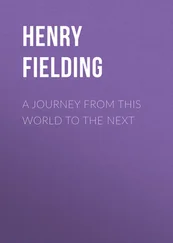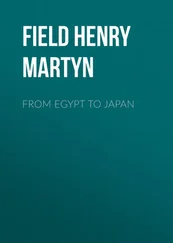Henry Field - From the Lakes of Killarney to the Golden Horn
Здесь есть возможность читать онлайн «Henry Field - From the Lakes of Killarney to the Golden Horn» — ознакомительный отрывок электронной книги совершенно бесплатно, а после прочтения отрывка купить полную версию. В некоторых случаях можно слушать аудио, скачать через торрент в формате fb2 и присутствует краткое содержание. Жанр: foreign_antique, foreign_prose, Путешествия и география, на английском языке. Описание произведения, (предисловие) а так же отзывы посетителей доступны на портале библиотеки ЛибКат.
- Название:From the Lakes of Killarney to the Golden Horn
- Автор:
- Жанр:
- Год:неизвестен
- ISBN:нет данных
- Рейтинг книги:5 / 5. Голосов: 1
-
Избранное:Добавить в избранное
- Отзывы:
-
Ваша оценка:
- 100
- 1
- 2
- 3
- 4
- 5
From the Lakes of Killarney to the Golden Horn: краткое содержание, описание и аннотация
Предлагаем к чтению аннотацию, описание, краткое содержание или предисловие (зависит от того, что написал сам автор книги «From the Lakes of Killarney to the Golden Horn»). Если вы не нашли необходимую информацию о книге — напишите в комментариях, мы постараемся отыскать её.
From the Lakes of Killarney to the Golden Horn — читать онлайн ознакомительный отрывок
Ниже представлен текст книги, разбитый по страницам. Система сохранения места последней прочитанной страницы, позволяет с удобством читать онлайн бесплатно книгу «From the Lakes of Killarney to the Golden Horn», без необходимости каждый раз заново искать на чём Вы остановились. Поставьте закладку, и сможете в любой момент перейти на страницу, на которой закончили чтение.
Интервал:
Закладка:
There is one other feature of this country that cannot be omitted from a survey of Ireland – it is the beggars , who are sure to give an American a warm welcome. They greet him with whines and grimaces and pitiful beseechings, to which he cannot harden his heart. My first salutation at Queenstown on Monday morning, on coming out in front of the hotel to take a view of the beautiful bay, was from an old woman in rags, who certainly looked what she described herself to be, "a poor crathur, that had nobody to care for her," and who besought me, "for the love of God, to give her at least the price of a cup of tea!" Of course I did, when she gave me an Irish blessing: "May the gates o Paradise open to ye, and to all them that loves ye!" This vision of Paradise seems to be a favorite one with the Irish beggar, and is sometimes coupled with extraordinary images, as when one blesses her benefactor in this overflowing style: "May every hair on your head be a candle to light you to Paradise!"
This quick wit of the Irish serves them better than their poverty in appealing for charity; and I must confess that I have violated all the rules laid down by charitable societies, "not to give to beggars," for I have filled my pockets with pennies, and given to hordes of ragamuffins, as well as to old women, to hear their answers, which, though largely infused with Irish blarney, have a flavor of native wit. Who could resist such a blessing as this: "May ye ride in a fine carriage, and the mud of your wheels splash the face of your inimies," then with a quick turn, "though I know ye haven't any!"
Yesterday we made an excursion through the Gap of Dunloe, a famous gorge in the mountains around Killarney, and were set upon by the whole fraternity – ragtag and bobtail. At the foot of the pass we left our jaunting car to walk over the mountain, C – alone being mounted on a pony. I walked by her side, while our two theological professors strode ahead. The women were after them in full cry, each with a bowl of goat's milk and a bottle of "mountain dew" (Irish whiskey), to work upon their generous feelings. But they produced no impression; the professors were absorbed in theology or something else, and setting their faces with all the sternness of Calvinism against this vile beggary, they kept moving up the mountain path. At length the beggars gave them up in despair, and returned to try their mild solicitations upon me. An old siren, coming up in a tender and confiding way, whispered to me, "You're the best looking of the lot; and it is a nice lady ye have; and a fine couple ye make." That was enough; she got her money. I felt a little elated with the distinguished and superior air which even beggars had discovered in my aspect and bearing, till on returning to the hotel, one of our professors coolly informed me that the same old witch had previously told him that "he was the darling of the party!" After that, who will ever believe a beggar's compliment again?
But we must not let the beggars on the way either amuse or provoke us, so as to divert our attention from the natural grandeur and beauty around us. The region of the Lakes of Killarney is at once the most wild and the most beautiful portion of Ireland. These Lakes are set as in a bowl, in the hollow of rugged mountains, which are not like the Green Mountains, or the Catskills, wooded to the top, but bald and black, their heads being swept by perpetual storms from the Atlantic, that keep them always bleak and bare. Yet in the heart of these barren mountains, in the very centre of all this savage desolation, lie these lovely sheets of water. No wonder that they are sought by tourists from America, and from all parts of the world.
Nor are their shores without verdure and beauty. Though the mountain sides are bare rock, like the peaks of volcanoes, yet the lower hills and meadows bordering on the Lakes are in a high state of cultivation. But these oases of fertility are not for the people; they all belong to great estates – chiefly to the Earl of Kenmare and a Mr. Herbert, who is a Member of Parliament. These estates are enclosed with high walls, as if to keep them not only from the intrusion of the people, but even from being seen by them. The great rule of English exclusiveness here obtains, as in the construction of the old feudal castles, the object in both cases being the same, to keep the owners in, and to shut everybody else out. Hence the contrast between what is within and what is without these enclosures. Within all is greenness and fertility; without all is want and misery. It will not do to impute the latter entirely to the natural shiftlessness of the Irish people, as if they would rather beg than work. They have very little motive to work. They cannot own a foot of the soil. The Earl of Kenmare may have thousands of acres for his game, but not a foot will he sell to an Irish laborer, however worthy or industrious. Hence the inevitable tendency of things is to impoverish more and more the wretched peasantry. How long would even the farmers of New England retain their sturdy independence, if all the land of a county were in a single estate, and they could not by any possibility get an acre of ground? They would soon lose their self-respect, as they sank from the condition of owners to tenants. The more I see of different countries, the more I am convinced that the first condition of a robust and manly race is that they should have within their reach some means, either by culture of the soil or by some other kind of industry, of securing for themselves an honest and decent support. It is impossible to keep up self-respect when there is no means of livelihood. Hence the feeling of sadness that mingles with all this beauty around me; that it is a country where all is for the few, and nothing for the many; where the poor starve, while a few nobles and rich landlords can spend their substance in riotous living. Kingsley, in one of his novels, puts into the mouth of an English sailor these lines, which always seemed to me to have a singular pathos:
"Oh! England is a pleasant place for them that's rich and high;
But England is a cruel place for such poor folks as I."
That is the woe of Ireland – a woe inwrought with its very institutions, and which it would seem only some social convulsion could remove. Sooner or later it must come; we hope by peaceful methods and gentle influences. We shall not live to see the time, but we trust another generation may, when the visitor to Killarney shall not have his delight in the works of God spoiled by sight of the wretchedness of man; when instead of troops of urchins in rags, with bare feet, running for miles to catch the pennies thrown from jaunting cars, we shall see happy, rosy-cheeked children issuing from school-houses, and see the white spires of pretty churches gleaming in the valleys and on the hills. That will be the "sunburst" indeed for poor old Ireland, when the glory of the Lord is thus seen upon her waters and her mountains.
CHAPTER III.
SCOTLAND AND THE SCOTCH
In making the tour of Great Britain, there is an advantage in taking Ireland first, Scotland next, and England last, – since in this way one is always going from the less to the more interesting. To the young American traveller "fresh and green," with enthusiasm unexpended, it seems on landing in Ireland as if there never was such a bit of green earth, and indeed it is a very interesting country. But many as are its attractions, Scotland has far more, in that it is the home of a much greater people, and is invested with far richer historical and poetical associations; it has been the scene of great historical events; it is the land of Wallace and Bruce, of Reformers and Martyrs, of John Knox and the Covenanters, and of great preachers down to the days of Chalmers and Guthrie; and it has been immortalized by the genius of poets and novelists, who have given a fresh interest to the simple manners of the people, as well as to their lakes and mountains.
Читать дальшеИнтервал:
Закладка:
Похожие книги на «From the Lakes of Killarney to the Golden Horn»
Представляем Вашему вниманию похожие книги на «From the Lakes of Killarney to the Golden Horn» списком для выбора. Мы отобрали схожую по названию и смыслу литературу в надежде предоставить читателям больше вариантов отыскать новые, интересные, ещё непрочитанные произведения.
Обсуждение, отзывы о книге «From the Lakes of Killarney to the Golden Horn» и просто собственные мнения читателей. Оставьте ваши комментарии, напишите, что Вы думаете о произведении, его смысле или главных героях. Укажите что конкретно понравилось, а что нет, и почему Вы так считаете.












